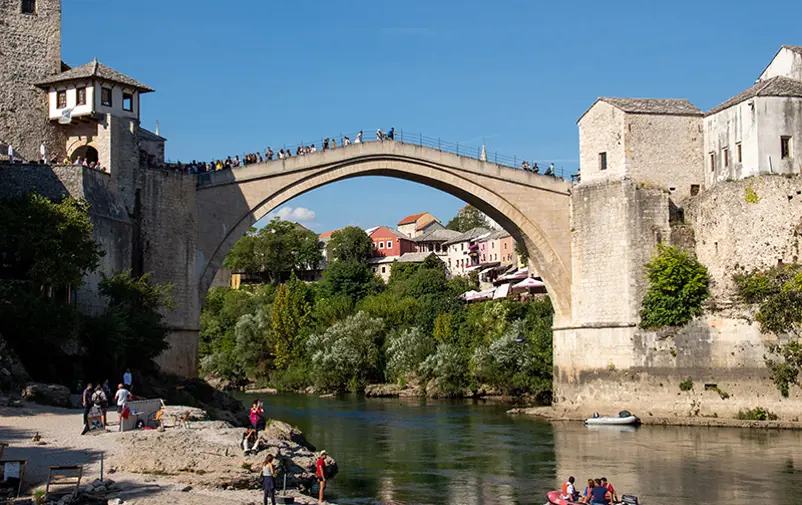FBA in the western Balkans
The countries of the western Balkans still suffer as a result of the disintegration of the former Yugoslavia and subsequent conflicts in the 1990s. While closer ties to the European Union are an important driving force for regional development, unresolved conflicts within and between these countries are hindering reform. The main focus of the FBA’s work in the region is Bosnia and Hercegovina.During the second half of the twentieth century, the region that today constitutes the western Balkans was largely part of the multicultural Socialist Federal Republic of Yugoslavia. After the death of President Josip Broz Tito in 1980, socialism was gradually eroded by growing nationalist tendencies, leading to the secession of many former Yugoslav republics and increasing ethnic tensions. This culminated in a brutal war in Bosnia and Hercegovina that claimed some 100,000 lives, victimising further tens of thousands who suffered from wartime atrocities and displacement.
For the population of the western Balkans, memories of the Yugoslav Wars and its unresolved conflicts and traumas are very much part of everyday life, as reflected in the region’s politics. Reforms for human rights and democracy are held back by tensions between ethnic groups, while widespread corruption contributes to the general distrust of public institutions and those in power.
Most of the FBA’s work in the region is conducted in Bosnia and Hercegovina. In Bosnia and Hercegovina, divisions between the country’s three largest ethnic groups – Bosniaks, Bosnian-Croats and Bosnian-Serbs – permeate all levels of society. While the Dayton Accords of 1995 may have ended the war in Bosnia, the subsequent constitution split political power along ethnic lines, effectively maintaining the division of the country.
Although its status as a potential EU Member State is the strongest unifying force in the country, support differs between the different ethnic groups.
The FBA’s operations in Bosnia and Hercegovina are still in the start-up phase and work will initially focus on the following areas within the framework of the Strategy for Sweden’s reform cooperation with the Western Balkans and Turkey for 2021–2027:
Dialogue and Peace Processes
The FBA is tasked with building trust between relevant actors in order to increase opportunities for future dialogue and cooperation. The FBA will focus on strengthening existing forces for peace, including by supporting relevant actors in their confidence-building efforts. For example, the FBA can offer platforms for dialogue and cooperation, arrange exchanges of experience and support capacity-enhancing activities through training and consultation.
Democratic Security Sector Governance
The FBA is tasked with collaborating with state and other relevant actors on reforms and processes that strengthen the democratic governance of the security sector. This may be achieved through measures such as collaborating with other international actors to support and advise Bosnian authorities in ongoing efforts to end and prevent conflict and contributing to inclusive reconciliation processes.
Women, Peace and Security
The FBA’s gender equality efforts in Bosnia seek to alter institutional and organisational power structures through gender mainstreaming in line with Sweden’s National Action Plan for the implementation of the UN Security Council’s Resolutions on Women, Peace and Security. The FBA is tasked with strengthening structures for gender equality work within institutions and organisations of significance to the ongoing peace process. This is intended to reinforce their ability to meet the security needs of women, men, girls and boys.
Rule of Law, Human Rights and Elections
The FBA is tasked with supporting state actors, support that is predicated on increased trust between state actors and citizens through greater transparency, the responsible exercise of public authority and dialogue between the state and civil society. The FBA also strives to strengthen civil society organisations in both their scrutinising role and function as a supplement to state actors in areas such as disseminating information about social services. In this way, the FBA will contribute to creating and maintaining inclusive, legally certain, gender-equal processes in the region that promote sustainable reconciliation and human rights.








 >
> >
>

